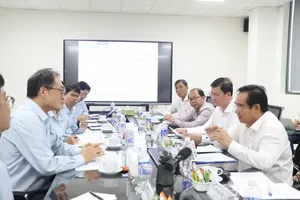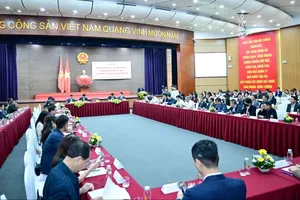
In an interview with Sai Gon Giai Phong Newspaper, National Assembly (NA) delegate Phan Duc Hieu, serving on its Economic and Financial Affairs Committee, spoke candidly about the practice of oversight in general, drawing specifically from his experience with the supervision committee on “The implementation of policies and laws on real estate market management and social housing development from 2015 to the end of 2023”.
He provided a detailed evaluation on the effectiveness of this implementation. Oversight is a critical, constitutionally-enshrined function of the NA, aimed at reviewing the activities of state agencies to ensure their compliance with the Constitution and the law. While there have been many positive achievements, there are still various challenges in performing this function.
First, the current law is quite vague, defining oversight simply as the monitoring and evaluation of a supervised entity. Its outcomes are limited to reports and resolutions. This makes it difficult to determine the necessary level of detail for the assessments.
As a result, many oversight conclusions tend to be descriptive and general, pointing out obstacles in law enforcement but lacking the quantitative data and universal applicability to pinpoint specific violations and assign responsibility, especially when compared to the findings of an inspection or an audit.
Second, the legal weight and enforceability of the current oversight resolutions are limited. Many of the findings are just recommendations or directional guidance, requiring further review and research before they can be implemented.
Yet the most serious challenge lies in the quality of input information. The completeness, reliability, and comprehensiveness of the received data is a major issue. While reports from state agencies are official, they are often insufficient to satisfy the needs, and the ability to access alternative sources to cross-check information and make truly accurate assessments is very limited.
Delegate Phan Duc Hieu shared in the NA’s forum that the oversight committee on the real estate market and social housing is facing its own set of difficulties, severely affecting the market.
The legal framework for the real estate market was in constant flux between 2015 and 2023, making any evaluation extremely complex. The supervision committee had to rely mainly on official reports, which limited its ability to produce quantitative conclusions or assign specific responsibility for violations. Despite extensive efforts to gather practical information through fieldwork and expert consultations, the final report remained general.

While this work did lead to tangible successes, such as the new social housing resolution (201/2025/QH15), a core challenge persists. The committee’s recommendations lack the specific detail of an audit and, crucially, a clear enforcement mechanism or penalties for non-compliance, making effective monitoring and follow-up a major difficulty.
Delegate Phan Duc Hieu then proposed solutions so that parliamentary oversight can be truly effective, helping to create a transparent real estate market, prevent “price fevers”, and most importantly, help low- and middle-income people secure housing.
From a legal perspective, it is crucial to implement fundamental reforms in the new draft Law on Supervisory Activities of the NA and People’s Councils. Four key changes are listed as follows:
- First, the objective of oversight must be redefined, separating it from inspections that check legal compliance. The National Assembly’s focus should not be on mere rule-following, but on assessing the real-world impact and effectiveness of its own laws. The goal is to determine if a policy achieved its aims efficiently and without unintended consequences, pinpointing failures in the law or its implementation.
- Second, the quality of the input information must be improved. The law needs new provisions to mandate more complete and comprehensive reporting for oversight purposes. Accurate, multi-dimensional information is the foundation for any objective assessment.
- Third, the legal weight of the oversight resolutions must be clarified, and penalties for non-compliance must be established. For example, when the NA passes a resolution on social housing, there must be a mechanism to ensure those solutions are implemented with a clear roadmap and resources.
- Fourth, the independence of oversight delegation members must be enhanced and their responsibility clarified, especially their independence from the advisory bodies that assist them. In practice, the role of different members can vary greatly, and dissenting expert opinions are sometimes diluted through the “clarification” process.
Achieving these goals ensures that the oversight activities will truly become a tool for “constructive development”, helping to improve the enforcement of laws and perfect our institutional framework, both for the country in general and for the real estate market in particular.
























